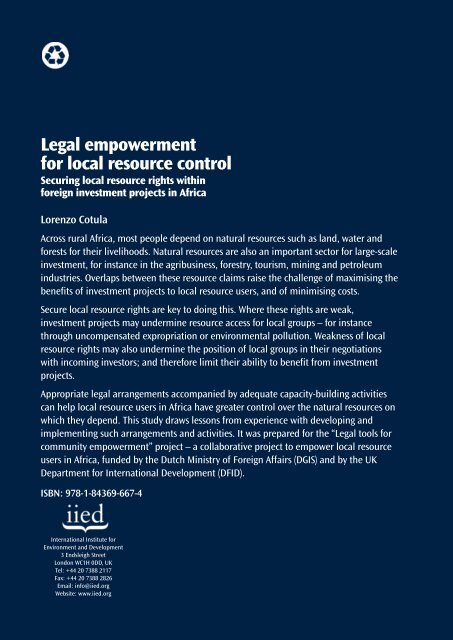Legal empowerment for local resource control
Legal empowerment for local resource control
Legal empowerment for local resource control
Create successful ePaper yourself
Turn your PDF publications into a flip-book with our unique Google optimized e-Paper software.
<strong>Legal</strong> <strong>empowerment</strong><br />
<strong>for</strong> <strong>local</strong> <strong>resource</strong> <strong>control</strong><br />
Securing <strong>local</strong> <strong>resource</strong> rights within<br />
<strong>for</strong>eign investment projects in Africa<br />
Lorenzo Cotula<br />
Across rural Africa, most people depend on natural <strong>resource</strong>s such as land, water and<br />
<strong>for</strong>ests <strong>for</strong> their livelihoods. Natural <strong>resource</strong>s are also an important sector <strong>for</strong> large-scale<br />
investment, <strong>for</strong> instance in the agribusiness, <strong>for</strong>estry, tourism, mining and petroleum<br />
industries. Overlaps between these <strong>resource</strong> claims raise the challenge of maximising the<br />
benefits of investment projects to <strong>local</strong> <strong>resource</strong> users, and of minimising costs.<br />
Secure <strong>local</strong> <strong>resource</strong> rights are key to doing this. Where these rights are weak,<br />
investment projects may undermine <strong>resource</strong> access <strong>for</strong> <strong>local</strong> groups – <strong>for</strong> instance<br />
through uncompensated expropriation or environmental pollution. Weakness of <strong>local</strong><br />
<strong>resource</strong> rights may also undermine the position of <strong>local</strong> groups in their negotiations<br />
with incoming investors; and there<strong>for</strong>e limit their ability to benefit from investment<br />
projects.<br />
Appropriate legal arrangements accompanied by adequate capacity-building activities<br />
can help <strong>local</strong> <strong>resource</strong> users in Africa have greater <strong>control</strong> over the natural <strong>resource</strong>s on<br />
which they depend. This study draws lessons from experience with developing and<br />
implementing such arrangements and activities. It was prepared <strong>for</strong> the “<strong>Legal</strong> tools <strong>for</strong><br />
community <strong>empowerment</strong>” project – a collaborative project to empower <strong>local</strong> <strong>resource</strong><br />
users in Africa, funded by the Dutch Ministry of Foreign Affairs (DGIS) and by the UK<br />
Department <strong>for</strong> International Development (DFID).<br />
ISBN: 978-1-84369-667-4<br />
International Institute <strong>for</strong><br />
Environment and Development<br />
3 Endsleigh Street<br />
London WC1H 0DD, UK<br />
Tel: +44 20 7388 2117<br />
Fax: +44 20 7388 2826<br />
Email: info@iied.org<br />
Website: www.iied.org

















